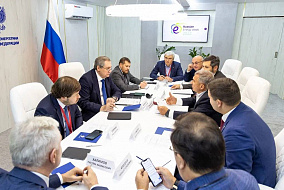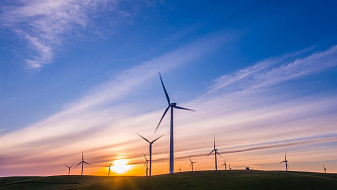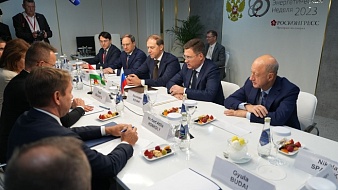The ‘Territory of Energy Dialogue 2023’ Conference Held in Moscow

The ‘Territory of Energy Dialogue 2023’
Scientific and Practical Conference has wrapped up in Moscow. Experts
participating in the plenary session discussed the medium and long-term
scientific and technological development of the Russian fuel and energy sector
in the new reality and attended panel sessions dedicated to energy security,
the development of the coal industry, new energy sources, and statistics and
forecasting as they relate to energy.
The plenary session, entitled ‘Medium and
Long-Term Scientific and Technological Development in the Russian Fuel and
Energy Sector in a New Reality’, saw experts identify the factors and emerging
technological trends they believe will shape the future energy landscape and
talk about how to ensure the Russian fuel and energy sector continued to
develop and advance scientifically and technologically.
According to Director General of the Russian
Energy Agency of the Russian Ministry of Energy Alexey Kulapin, present at the
plenary session, the Russian fuel and energy sector could contribute enormously
to the nation’s economic development and scientific and technological growth.
“In 2023, Russia’s fuel and
energy sector must focus on driving the nation’s economic development and the
growth of our scientific and technological potential. Upon this depend the
stability of domestic energy supplies and global competitiveness. Furthermore,
tasks remain for strengthening technological sovereignty and developing new
domestic technologies that will enable us to accomplish all our goals,” he said.
He likewise emphasized that “existing technological trajectories provide
an opportunity to choose the optimal path to achieving the nation’s goals while
maintaining sustainable economic growth and reducing the impact on the
environment. It is also important that the domestic fuel and energy sector not
lose sight of critical technologies capable of guaranteeing our technological
sovereignty for the immediate future and promising technologies capable of
doing the same over the medium and long term.”
The plenary session was moderated by Plekhanov
Russian University of Economics Rector Ivan Lobanov. He noted the need for existing
models of global energy development to be revised to fit the new geopolitical
reality: “The global energy industry is
currently developing under the uncertainty of the current geopolitical
situation, ongoing energy transition trends, and accelerating scientific and
technological progress. And these conditions are transforming global energy
markets and energy transport and logistics corridors and destroying channels
for the transfer of technologies, components, and materials in the sector.
Existing global energy development models are losing their relevance, and as a
result we need a new understanding of prospects and possible development
scenarios”.
The conference included a panel session
entitled ‘Energy Development Strategies of Russia and ASEAN: Comparative
Aspects and Prospects for Scientific and Technical Cooperation’. ASEAN is
experiencing a significant increase in energy consumption. For example,
according to ASEAN Energy Outlook 2022, Southeast Asian demand for energy is
expected to triple by 2050 and lead to the region’s transformation into a net
importer of both natural gas and coal, requiring adjustments to the region’s
energy development patterns. Russia is also in the process of creating a new
energy strategy for the period up to 2050 that will take into account carbon
neutrality goals for 2060.
International experts attending the panel
session included:
- ASEAN Centre for Energy Executive Director Nuki Agya Utama;
- Director of Oil and Gas Infrastructure Planning and Development at the
Ministry of Energy and Mineral Resources of the Republic of Indonesia Laode
Sulaeman;
- Professor at King Mongkut's Institute of Technology Ladkrabang (Thailand)
Atit Tippichai.
Utama spoke about the outlook for cooperation
with Russia: “Russia and ASEAN share some common energy ground in our
dependence on fossil fuels like gas, oil, and coal. It is important that we
strive for carbon neutrality in the next 20–30 years, it is very important, as
is the development of renewable energy sources. I think our countries can
discuss a dynamic partnership in this sector and contribute much to the fuel
and energy sector”.
“The ‘Territory of Energy
Dialogue 2023’ Scientific and Practical Conference plays an important role in
the development of cooperation and innovation in the energy sector. By
gathering these experts, researchers, and industry professionals together in
one place, we ensure important discussions take place and technologies and
policies essential to Russia’s sustainable energy future are developed. This
year’s conference, held as part of Russian Energy Week as in previous years,
has garnered international recognition,” Deputy Director of the Roscongress Foundation
and Director of the Russian Energy Week International Forum Vladimir Zatynaiko
said.
The ‘Territory of Energy Dialogue 2023’
Scientific and Practical Conference was held at the Russian Energy Week
International Forum.
The ‘Territory of Energy Dialogue’ Scientific and Practical Conference was organized by the Russian Energy Agency of the Ministry of Energy of Russia in conjunction with the Roscongress Foundation.
Session Partners included InfoWatch Group of Companies and the KNGK Group.





